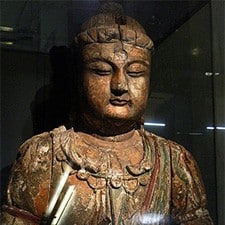Letting go of attachments
By L. B.

If a person doesn’t change inside, it doesn’t matter where they go. They can go to the moon, and if they haven’t changed inside, they’ll be the first person on the moon in jail.”
Darnell Jackson
Wisconsin Secure Program Facility
Contributed by Tonen
For several months now I have been watching how the attachments in my life affect me from day to day. I have also reviewed how those attachments have had an effect on my past and my future.
I have been in prison most of my life, having come to prison at the tender age of eighteen, very miserable and frightened and full of attachments. I remember my first day in prison, and how my attachment to food almost killed me. I had been living in the county jail for six months prior to coming to the state prison. In the county jail all of the food was either cooked to a mush or a fine paste. There was hardly much solid food, so I had grown used to gulping down my meals. The day that I arrived in prison they just happened to be serving chuck steak, potatoes, and gravy, along with rolls and apple pie. I remember them rolling in the food cart to where I was being processed. The food looked and smelled so good that my mouth started to water like Pavlov’s dog.
As soon as they served my tray I started cutting up that chuck steak and shoveling food into my mouth. I hadn’t thought about the eating habits that I had picked up in the county jail. Rather, I was only concerned with the wonderful food and getting as much of it in my belly as I could. As soon as I cut a piece of chuck steak, I shoved it into my mouth and swallowed it. Well, I tried to swallow it, but it became lodged in my airway and I could not breathe. I started to panic. I stood up and pointed to my throat and pounded on my chest while looking at the guard, who was looking at me like I had gone insane and was going to attack him. He did not realize that I was choking.
Just about the time that I had decided to run myself into a wall to try to dislodge the meat stuck in my throat, I swallowed it. I stood there for a minute or two just breathing in deeply and enjoying the fact that I was alive. After a bit I started in on my meal again, but I was so concerned about choking that I did not enjoy the rest of my meal.
For nearly six years we had the same meal on Wednesdays. I always made sure that I chewed my steak thoroughly so as to avoid choking. I was constantly reminded how my attachment and greed around consuming food nearly cost me my life. Even today many years later, I find myself trying to bring solace into my life by consuming food, and it is usually food that is not good for me. I keep thinking that if I fill my belly with good tasting food then I will be happy, yet once my belly is full all I feel is a bellyache.
It may just be my perception, but those of us in prison seem to be so much more attached to things than those on the outside. Be it canteen items, mail, or loved ones who visit, we attach ourselves and hang on to them as though our very lives depend on them. I remember times in the past when my entire mood for the day was set on whether I had received any mail from my wife. Oh, and if my wife did not tell me that she loved me in her letter, I would be devastated. I would go around for days at a time angry at anyone and anything that stepped into my world.
Even today, many years later, I find myself each day anticipating what kind of mail I will get, who has sent it, and why. I am not discouraged by this. I realize that it is attachment, but I am working on that. I am no longer devastated to the point of anger, and I always remind myself that I don’t need mail to be happy. When I am able to let go completely, I pat myself on the back and move on. More often than not, though, I find myself rocking back and forth on my feet, anticipating mail call when it comes around each day. However, each time I let go of something that I am attached to, I reinforce that good quality of non-attachment and remind myself that the more I let go, the stronger I will be to let go quicker the next time. Eventually I will not be attached to the mail, the persons I care about, or anything else. I will have found that equanimity, that balance that Lord Buddha teaches is all-important, where I am not attached yet not disinterested, where I am balanced in my feelings and thoughts toward all things.
I often wonder when I am looking at my attachments how they all began. How does a person become attached? How do we get those wrong views and distorted beliefs, thinking that someone or something outside of us will make us happy? If we are not born with them, where do they come from?
I am sure that they come from our thoughts and experiences. Our views and beliefs become distorted. Our perceptions become warped and we attach attributes and beliefs to things that are not true. For example, there are a lot of people in the world who believe when they grow up that Santa Claus is real, until they are told he isn’t or until they figure it out for themselves. But for years as children we are told that Santa Claus exists, and each Christmas we wake up to find toys and other gifts under the tree from Santa. In our minds he is so real, and yet he does not exist. Although we have a strong belief that he is real, it is a false belief, not true in reality.
The story of the snake that is not a snake shows how our perceptions can be wrong, thus distorting our mental view. Let’s say you are walking down a mountain trail at dusk when you see a long snake lying across the trail. Your mind sees the scales on the snake, its beady eyes—you may even think you hear it rattle, and fear pumps adrenaline into your bloodstream. You are getting ready to fight or run. Then you turn your flashlight on it and you see that the scary thing is really just a braided rope lying across the path. It’s only a rope, and yet until you shined light on it, you thought it was a deadly snake. The wrong views and perceptions we have about our lives, surroundings, and beliefs are similar. They cause us to become attached to things, to project false traits onto them that cause us suffering. We need to shine the light of understanding on our wrong views.
Lama Thubten Yeshe’s example of chocolate cake shows us how wrong beliefs produce attachment and suffering. He says, ”When we are children and we want chocolate cake, we think that when we grow up we can have all the chocolate cake we want and then we will be happy. Yet when we grow up and have all the cake we want we are not happy. All we have is a bellyache.”
Most of us hold false views on many things our entire lives. We project false attributes on things, think they will be a certain way, and then we suffer more. What we need is to look at things deeply, take them apart in our minds, and see how they really are—see that they are impermanent and see their true nature. We do this through introspection and meditation. We do this by seeing how we first believe things to be, seeing how they turn out to be, and then asking ourselves, “Why?”
I find it very hard to change my beliefs and the thought patterns I’ve formed over the years. It is painful to remove them or exchange them for new patterns or beliefs. The process is very slow. I try not to be discouraged by this. I remember that change comes in little steps that eventually lead to right views, right thinking, and right actions. If you can be present and mindful in the moment, you will not worry whether your progress is large or small. You will be content just that it is, and that is enough. By taking those small steps each day, by looking into the true reality of things, and by being in the present, we can let go of attachments and realize happiness.
Incarcerated people
Many incarcerated people from all over the United States correspond with Venerable Thubten Chodron and monastics from Sravasti Abbey. They offer great insights into how they are applying the Dharma and striving to be of benefit to themselves and others in even the most difficult of situations.


